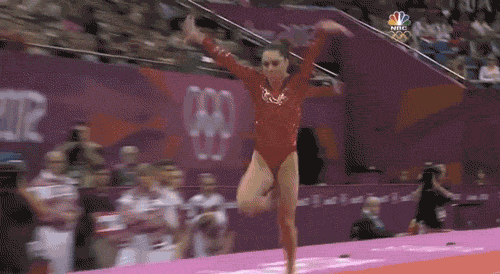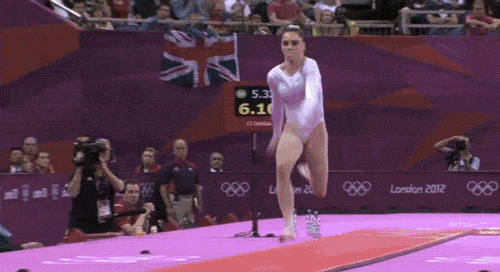Disclaimer: This list is depressing enough without death and police reports; as such, we've omitted some notable tragedies.
McKayla Maroney, gymnast, U.S.A.
More so than Usain Bolt's dominance or Michael Phelps's swan song, Maroney's "not impressed" face will likely be the most lasting image of the London Olympics. But the levity of one of the year's most widespread memes overshadows what a devastating loss her silver medal in the vault was.
Let's revisit the back story: there are four events in the women's team gymnastics competition. Maroney was included on the team for one event because she is by far and away the best woman on the planet at the vault. Side-by-side photo comparisons showed her exploding higher off the vault than male gymnasts with 30 more pounds of muscle. During the team competition, experts excoriated the judges for not giving Maroney's flawless Amanar a perfect score.
Her specialized dominance helped the Americans win gold, and reinforced a firm and realistic expectation of gold in the individual vault event. Maroney hit the Amanar for a half-point lead going into her second and final vault, but under-rotated and fell onto her butt during the landing.
(GIFs via BuzzFeed)
And yet she still held the lead with one gymnast to go. Think about it: over the course of two vaults, McKayla Maroney can fall on her ass on one of them and still be better than anyone in the world -- anyone except the final competitor, Sandra Izbasa of Romania, who hit her vault to win gold by just .108 of a point. This wasn't an upset like the 18-0Patriots losing to the Giants in the Super Bowl; it was like the 18-0 Patriots losing to Purdue.
Forget the damn meme. Look at the face of a 16-year-old girl whose cast-iron dream just crumbled.
(Photos: Mark Rebilas - USA TODAY Sports)
Since the medal ceremony, Maroney's had nothing but the best attitude about her meme -- posing with the "not impressed" face on her Instagram with her teammates and reenacting it for photo ops with dignitaries as high up as the President. Who knows? Maybe the fame from the meme will be more beneficial to Maroney in the long run.
Me? I'd rather have the gold medal.
Chad Johnson, wide receiver, Miami Dolphins
After an invisible season in New England -- his worst as a pro -- things were looking up for Chad Johnson this summer. He got married to Evelyn Lozada, for whom he professed a very real love ("If you pause Call of Duty for someone, then that's the f-----g one"). He changed his surname from Ochocinco back to the original Johnson. He signed with his hometown Dolphins and seemed dedicated and serious about keeping his career alive.
The first episode of this season's "Hard Knocks" showed Johnson leaving team headquarters on the players' day off. "Stu, I promise I'm getting arrested while we're off,"he joked to a team employee.
Four days later, Johnson was arrested on domestic violence charges after allegedly head-butting Lozada. The Dolphins cut him the next day. Lozada filed for divorce after 41 days of marriage -- just 0.57 of a Kardashian (standard unit for short-lived marriages). VH1 canceled production of their reality show.
How could being arrested, getting fired, and losing your wife in the span of three days possibly get any worse? Easy: HBO records you getting fired and airs it on TV four days later.
For all the drunken antics, grainy night-vision hook-ups, and manufactured drama that have become the hallmarks of reality television, few reality TV scenes over the last two decades have been more real or more dramatic than Joe Philbin's frank and businesslike -- but not unkind -- dismissal of a visibly anguished Johnson.
Marcus Lattimore, running back, South Carolina
In 2011, Marcus Lattimore tore his left ACL, then worked incredibly hard to get back on the football field in 2012. It worked: he was running all over the SEC until Oct. 27, when he suffered possibly the most gruesome sports injury of 2012:
Instead of returning for his senior year in 2012, Lattimore will enter the NFL Draft in April with two surgically repaired knees -- a medical history that will likely cost him millions of dollars.
Lance Armstrong, cyclist
Do not mistake this for pity. Armstrong himself isn't sad:
"Doo dee doo, hangin' out and reflectin' on all those Tours de France I didn't win. Weird how I still have all these yellow jerseys, huh?"
Armstrong isn't sad, because he still has his fame and his millions of dollars (if not the Nike contract to keep those millions regenerating). What's sad is that millions of cancer patients found strength in Armstrong's vitality and character. The former was boosted with performance-enhancing drugs; the latter was never there.
Professional Hockey Players
It's generally a bad sign when your best career move is "relocate to Russia."
Aubrey Huff, IF/OF, San Francisco Giants
Huff came into the 2012 season broken down after his worst year. His wife filed for divorce in January. In April, he filled in at second base against the Mets and failed to cover second on a double play ball, costing the Giants the game.
The next day he went on the disabled list to treat anxiety issues; rumors persisted that his divorce was a factor. After returning from the DL, he sprained his knee jumping over a rail in celebration of Matt Cain's perfect game. He came back and promptly went back on the DL with tendinitis in the same knee. A fair appraisal of his baseball skills come September: he can no longer run, hit, or field.
But he played in the World Series! (He pinch-hit in one game and grounded out on the only pitch he saw.) The Giants declined his $10 million club option in November.
Larry Fitzgerald, wide receiver, Arizona Cardinals
In the five seasons from 2007 to 2011, Larry Fitzgerald never had fewer than 90 receptions or 1092 yards receiving. This year he had just 71 catches for 798 yards and a career-low four touchdowns despite being targeted just as often. So what happened?
Kevin Kolb,
John Skelton,
Ryan Lindley and
Brian Hoyer, respectively (though there were several weeks where it was a Lindley-Skelton coin flip). That list is so bad, it's almost unfair to lump in Kevin Kolb with the other three. "Hey, that's not fair to Kolb! He's almost mediocre!"
Football trivia: quarterbacks are pretty important.
John Wall, point guard, Washington Wizards
The Wizards finished 20-46 in the lockout-shortened 2011-12 season. The only reason they weren't the worst team in the NBA was [BOBCATS], and the lone bright spot on the team was Wall.
Before the season, Wall was diagnosed with the beginning of a stress fracture in his knee, and doctors thought he'd be out for eight weeks. Ten weeks after those eight weeks, the timetable was changed to "there's no timetable." That was four weeks ago. The most recent guess is "some time in January." The Wizards are 4-24.
Greg Oden, center, Portland TrailBlazers
If I compiled this list annually, this would likely be Oden's fourth or fifth consecutive appearance here. On the off chance you haven't been keeping up with Oden:
- February 2012: underwent third microfracture surgery
- March: waived by Portland
- May: opened up in an interview about drinking heavily during rehab
- June: Kevin Durant -- the guy who, y'know, was drafted right after him in 2007 -- made the NBA Finals as the best player on the league's most electric team
- still injured
- still hasn't played since '09-'10 season
- hoping to sign with a team and play in the '13-'14 season
WELP.
Alex Smith, quarterback, San Francisco 49ers
Smith started his year by playing maybe his best game as a professional in a 36-32 victory over the Saints in the playoffs. It was an incredible turnaround for a beleaguered quarterback who struggled for six seasons before coming into his own under coach John Harbaugh.
What a great story! Alex Smith was finally The Man in San Francisco! ... until the 49ers openly sought Peyton Manning to replace him in the offseason. Smith visited the Dolphins during free agency, but re-signed with the Niners when their bid for Manning fell through.
But hey, that's just business, right? Smith was still the starter, and he got the job done throughout the first half of the season. In beating Arizona to raise the Niners' record to 6-2, Smith completed 18-of-19 passes for 232 yards, three touchdowns, and no interceptions. The next week against St. Louis, he started 7-of-8 with a touchdown before going down with a concussion.
Colin Kaepernick filled in for Smith admirably, then got a start against the Bears and looked AWESOME. Like, SO MUCH BETTER than Smith on his best day. Kaepernick kept the starting job, and Smith became the first quarterback to get benched with a completion percentage better than 70% and a passer rating of 104.1. Now he looks like this when Kaepernick leads the team to a touchdown.
Alex Rodriguez, third baseman, New York Yankees
Perhaps you have heard of Alex Rodriguez. He is 37 years old and makes thirty million dollars a year to play baseball, which is more than anyone else in the world is paid to play baseball. Let's see how his 2012 went:
- Broke his hand and went on the DL
- Finished the season with 16 home runs and 62 RBI, ending his 13-year streak of 30-HR/100-RBI seasons
- Went 3-for-25 during the playoffs, including 0-for-18 with 12 strikeouts against right-handers, resulting in his benching
- Used his benching as an opportunity to hit on women in the stands (the New York media and Yankee fans were somewhat displeased by this)
- Good news: he played poorly because his hip was injured!
- Bad news: he'll undergo surgery on the hip in January and be out of the Yankees lineup until at least June or July
- This Deadspin post
BONUS LAST-MINUTE ADDITION! Tony Romo, quarterback, Dallas Cowboys












